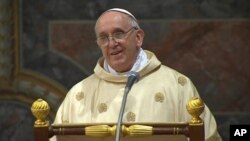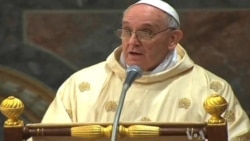Roman Catholic cardinals have broken with tradition, electing a pope who is not from Europe, the first from Latin America and the first Jesuit.
Cardinal Jorge Mario Bergoglio, 76, Archbishop of Buenos Aires, Argentina, was elected the 266th pope and has taken the name of Francis.
Church historian Christopher Bellitto, who teaches at Kean University in Union, New Jersey, says the new pope is known for leading a simple life.
“He doesn’t have a chauffeured limousine, he takes a bus to work. He lives in a simple apartment, not an archbishop’s palace,” said Bellitto. “He is known for a simple prayer life. He also seems to cook for himself, every now and again.”
Pontiff Takes Name of Francis
George Ferzoco, professor of theology at Bristol University in England says the name a new pontiff takes is an important sign.
Related video report by Carolyn Presutti
“For the better part of the century or two, the same limited number of names have come up over and over again. What we have here is an unparalleled choice where we have someone with the name Francis. And it’s not just that this is a new name - it’s what that name signifies,” said Ferzoco. “It’s a saint and a name that reflects that saint who was committed to serving the poorest of the poor, to evangelizing, to spreading the word of the gospel, of service to the church.”
First Jesuit Pope
At the same time, Ferzoco said Francis is the first Jesuit elected to the papacy.
“With choosing someone from Bergoglio’s order, we have someone who has demonstrated from the very beginning of his priesthood a devotion to the papacy. He is absolutely unshakeable in the central power of the church - when I say power, I mean spiritual power,” said Ferzoco. “He is the first Jesuit to be pope and this alone is staggering, when you think that the Jesuit order was founded in the 16th century, very largely as ‘the shock troops of the pope.’ They are the order at the beck and call of the papacy.”
Bellito said both Saint Francis and the founder of the Jesuit order - Saint Ignatius of Loyola - were “company men”- “that is they are going to do what they are told to do but they are going to do those things in very innovative ways.”
Bellitto said it is difficult to predict how Pope Francis will deal with such issues as reforming the Vatican’s bureaucracy known as the Curia.
“A lot of people say 1/3 of the College of Cardinals works in the Curia - turn that around, 2/3 of the College of Cardinals - and 2/3 is what you need to get elected - 2/3 of the College of Cardinals are in dioceses," said Bellitto. “And it looks like they really wanted somebody who has lived working on problems at the church’s grassroots levels.”
Pope Francis succeeds Pope Emeritus Benedict XVI who resigned last month and is currently residing at the popes’ summer residence in Castel Gandolfo.
Cardinal Jorge Mario Bergoglio, 76, Archbishop of Buenos Aires, Argentina, was elected the 266th pope and has taken the name of Francis.
Church historian Christopher Bellitto, who teaches at Kean University in Union, New Jersey, says the new pope is known for leading a simple life.
“He doesn’t have a chauffeured limousine, he takes a bus to work. He lives in a simple apartment, not an archbishop’s palace,” said Bellitto. “He is known for a simple prayer life. He also seems to cook for himself, every now and again.”
Pontiff Takes Name of Francis
George Ferzoco, professor of theology at Bristol University in England says the name a new pontiff takes is an important sign.
Related video report by Carolyn Presutti
“For the better part of the century or two, the same limited number of names have come up over and over again. What we have here is an unparalleled choice where we have someone with the name Francis. And it’s not just that this is a new name - it’s what that name signifies,” said Ferzoco. “It’s a saint and a name that reflects that saint who was committed to serving the poorest of the poor, to evangelizing, to spreading the word of the gospel, of service to the church.”
First Jesuit Pope
At the same time, Ferzoco said Francis is the first Jesuit elected to the papacy.
“With choosing someone from Bergoglio’s order, we have someone who has demonstrated from the very beginning of his priesthood a devotion to the papacy. He is absolutely unshakeable in the central power of the church - when I say power, I mean spiritual power,” said Ferzoco. “He is the first Jesuit to be pope and this alone is staggering, when you think that the Jesuit order was founded in the 16th century, very largely as ‘the shock troops of the pope.’ They are the order at the beck and call of the papacy.”
Bellito said both Saint Francis and the founder of the Jesuit order - Saint Ignatius of Loyola - were “company men”- “that is they are going to do what they are told to do but they are going to do those things in very innovative ways.”
Bellitto said it is difficult to predict how Pope Francis will deal with such issues as reforming the Vatican’s bureaucracy known as the Curia.
“A lot of people say 1/3 of the College of Cardinals works in the Curia - turn that around, 2/3 of the College of Cardinals - and 2/3 is what you need to get elected - 2/3 of the College of Cardinals are in dioceses," said Bellitto. “And it looks like they really wanted somebody who has lived working on problems at the church’s grassroots levels.”
Pope Francis succeeds Pope Emeritus Benedict XVI who resigned last month and is currently residing at the popes’ summer residence in Castel Gandolfo.











